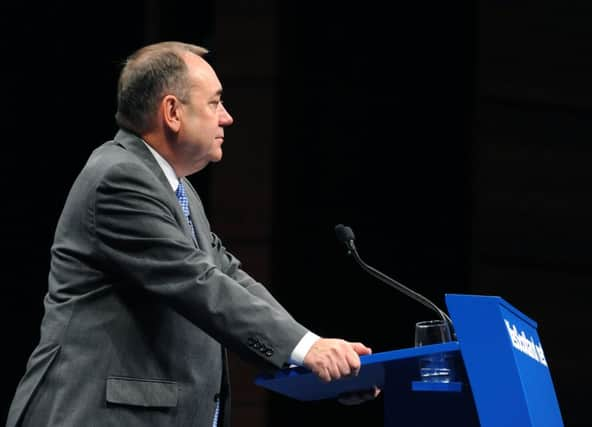Jane Bradley: Eyes of the world on Scotland


I am gaining huge muscles in my right bicep due to hours at a time holding a dictaphone high in the air above a politician’s head in a vain hope that it might pick up something, anything, that my ears cannot.
Occasionally, when it all gets a bit much, I allow myself to become overly pally with the person whose armpit I am smelling and lay my right hand, friendly-like, on their shoulder, for a bit of a rest, still clutching my dictaphone. I occasionally use their lower back as a makeshift desk for my notepad. They don’t usually seem to mind – or notice – they have bigger things to worry about.
Advertisement
Hide AdAdvertisement
Hide AdThe referendum media circus has kicked in with a vengeance. Hundreds of journalists from across the world have descended upon Scotland, causing a major scrum around any politician to show up in public.
At five foot two (and a very important half), I am usually at the back of such a scrum, catching a glimpse of Alex Salmond or Alistair Darling in between the dark-suited backs of a couple of London-based broadcast journalists and weighing up when to start using my sharp elbows to push to the front.
The American TV crews have turned up in their droves, dispatching perma-smiling correspondents to quiz the campaign leaders on the effect Scottish independence would have on the US – answer: not a lot.
Even the South Korean national broadcaster is keen to get in on the act: reporting the day’s referendum news.
For me, Scotland – like Edinburgh during Festival time, when trips down the Royal Mile invariably turn into a game of celebrity vs acquaintance spotting bingo (“Is that the man from accounts, or is it Tim Vine?”) – has become a minefield for social faux pas.
The problem is, my eyes spot a well-kent face and I habitually greet them with a big grin like an old friend, before realising that it’s not someone I occasionally bump into in the parliament canteen or the chap from next-door-but-one, but it’s actually Nick Robinson off the telly. Or Kay Burley. And obviously, they have no idea who I am, having never met me in real life.
Telling them that I’m actually quite familiar with the smell of their left armpit probably wouldn’t help much either.
Advertisement
Hide AdAdvertisement
Hide AdBut it’s not the first time I’ve got myself into a similar situation.
When I was a student at St Andrews University, I went into my local pub to meet some friends. I’d arrived a bit early, so was scanning the bar for anyone I knew to have a drink with before my pals turned up.
The chances I would know someone in the pub were high. This was St Andrews. If you hadn’t shared a flat – or a boyfriend – with at least three people in any one given room, there was something wrong.
My eyes alighted on a face I knew well, so I headed over, pint in hand, beaming smile on face, to sit down. His entire table was staring at me. The two big burly men sitting nearby were looking nervous. For it turned out he wasn’t a bloke whose name I’d forgotten from my Victorian Novel course. It was Prince William. And he was giving me a very strange look.
I retreated, pint still in hand, smile still plastered on face. And was rescued by my actual friends.
As a student journalist, I was probably the last person Prince William’s “people” would have wanted him to share a pint with. While the mainstream Scottish media generally left him in peace, there were always rumours of tabloid reporters posing as undergraduates, and paparazzi renting flats in key locations in the town.
But when Prince William left St Andrews, so did the media circus.
The question remains as to whether the same will happen in Scotland when referendum fever abates – no matter whether it is an “aye” or a “naw” – if the watching “eyes” of the world will disappear with it.
Advertisement
Hide AdAdvertisement
Hide AdIt’s fun to be the centre of attention for now. But let’s hope that, post-referendum, Scotland is in the international news for the right reasons – as a model of tolerance and acceptance of a successful democracy rather than the location of an ongoing feud between two opposing camps.
SEE ALSO